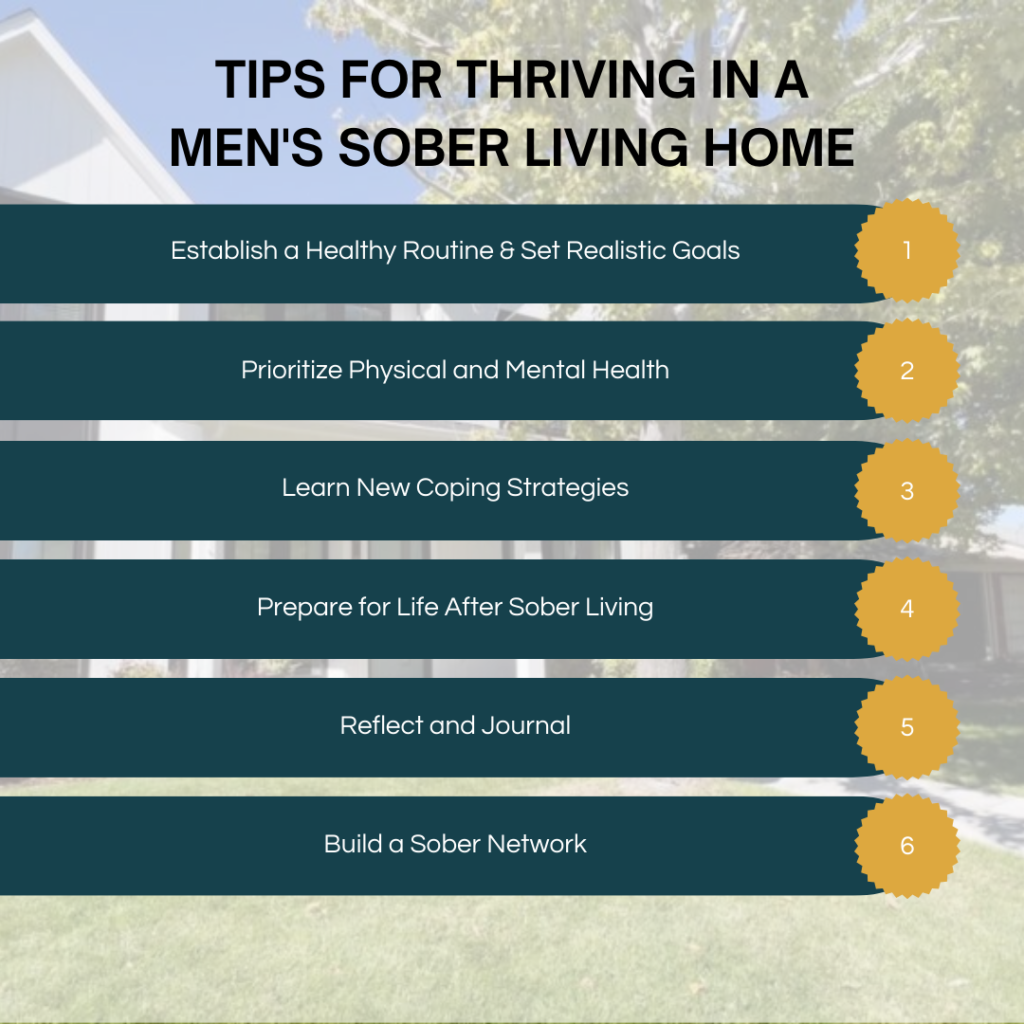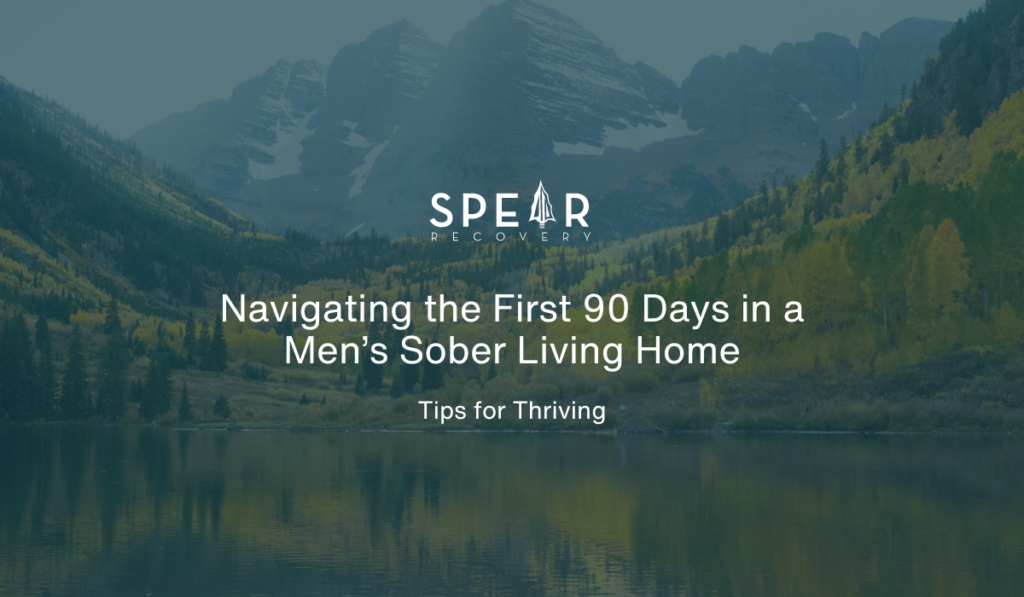The first 90 days in a sober living home can be a transformative period for men who have committed to a journey of recovery. After navigating the challenging waters of withdrawal and beginning the path to sobriety, the focus shifts towards building a sustainable lifestyle free from substance use. Here are 7 tips designed to guide men through their first 90 days in a men’s sober living home, ensuring they remain on the path to recovery and thrive in their new sober life.
7 Tips for Thriving in a Men’s Sober Living Home
As people who have been through recovery, we understand the troubles of staying the course. Most importantly, we understand how to navigate the early stages in recovery. That said, there are important tips that can help you navigate the first 90 days in a men’s sober living home.
Tip #1: Establish a Healthy Routine
Creating a structured daily routine is not just about filling your time; it’s about rebuilding your life piece by piece with habits that foster recovery and personal growth. A healthy routine in sober living might look like this:
- Morning Rituals: Start your day with purpose. Wake up at a consistent time, make your bed, engage in personal hygiene, and take a few moments for meditation or reflection to set a positive tone for the day.
- Chores and Responsibilities: Participate in the upkeep of the sober living home. Whether it’s doing dishes, cleaning common areas, or attending to personal laundry, these tasks instill a sense of responsibility and teamwork.
- Employment or Educational Activities: If you’re in a phase of your recovery where work or school is appropriate, dedicate structured hours to these pursuits. This can include job searching, attending classes, or completing assignments.
- Recovery Meetings and Therapy: Attend scheduled recovery meetings and therapy sessions. These are non-negotiable pillars of your routine, providing support and insights essential for maintaining sobriety.
- Nutrition and Meal Times: Eat balanced meals at regular times. Nutrition plays a crucial role in physical and emotional health, directly impacting your recovery.
- Physical Activity: Incorporate exercise into your routine, whether it’s a morning walk, a gym session, or a group sport. Physical activity boosts mood, reduces stress, and increases overall health.
- Evening Wind-Down: Dedicate time before bed to unwind. This could involve reading, journaling, or engaging in a hobby. Prepare for the next day, and aim for a consistent bedtime to ensure adequate rest.
Tip #2: Set Realistic Goals
Goal setting during the early stages of recovery gives direction and a sense of purpose. When setting goals, consider the following steps to ensure they are realistic and achievable:
- Short-Term Objectives: Break down your aspirations into smaller, manageable tasks. Short-term goals could include attending all scheduled meetings for the week, completing a step in a recovery program, or even engaging in daily physical activity.
- Measure Progress: Keep track of your accomplishments, no matter how small they may seem. Celebrating these milestones can significantly enhance your motivation and self-esteem.
- Be Specific and Timely: Define clear, specific goals with a realistic timeframe. For example, “I will apply to three jobs by the end of the month” is more actionable than “I want to find a job.”
- Seek Feedback: Share your goals with a mentor, counselor, or peer in your sober living home. They can offer support, accountability, and valuable insights to help you refine your objectives.
Tip #3: Prioritize Physical and Mental Health
Your recovery journey is as much about healing your body and mind as it is about abstaining from substances. To effectively support this holistic recovery, consider:
- Regular Exercise: Find a physical activity you enjoy and can participate in regularly. This might be yoga, strength training, cycling, or team sports. Regular exercise not only improves physical health but also has a profound positive impact on mental well-being.
- Nutritious Diet: Work on incorporating a balanced diet into your routine. Focus on whole foods, such as vegetables, fruits, lean proteins, and whole grains, which can help repair the body and provide the energy needed for recovery.
- Adequate Sleep: Prioritize getting 7-9 hours of sleep per night. Sleep is essential for healing and restoration, impacting mood, energy levels, and overall health.
- Mindfulness and Relaxation: Incorporate practices that reduce stress and promote mental health. Techniques such as mindfulness, meditation, deep breathing exercises, or speaking with a therapist can significantly aid in managing emotions and reducing the risk of relapse.
- Social Connections: Engage in positive social activities and build relationships that support your recovery. Positive social interactions can improve your mood and offer a sense of belonging and support.
Tip #4: Learn New Coping Strategies
In the supportive environment of a sober living home, you have a unique opportunity to learn and refine coping strategies that are crucial for managing stress, triggers, and cravings. This involves:
- Therapy Sessions: Engage deeply in individual or group therapy sessions offered by the home. These sessions are designed to help you uncover the root causes of your addiction, understand your triggers, and develop personalized strategies for dealing with them.
- Workshops and Educational Programs: Take advantage of workshops and programs focusing on stress management, emotional regulation, and relapse prevention. These can provide practical tools, like mindfulness techniques or cognitive behavioral strategies, which are effective in managing the complexities of recovery.
- Practical Application: Practice these strategies in real-life scenarios under the guidance of staff. Role-playing stressful situations or discussing recent challenges in group settings can offer insights into how these coping mechanisms can be applied daily.
Tip #5: Prepare for Life After Sober Living
Looking ahead and preparing for life post-sober living is crucial for a seamless transition into a sober lifestyle. This preparation includes:
- Career and Education Planning: Work with counselors to identify career goals and educational opportunities. This might involve resume building, job interview preparation, or enrollment in vocational training or higher education programs.
- Housing Search: Begin searching for a stable, sober-friendly living environment. Staff can assist in identifying suitable housing options and may offer resources or connections to help secure accommodation.
- Financial Planning: Attend budgeting and financial planning workshops to ensure you can manage your finances responsibly once you leave the sober living environment. Learning to handle finances is crucial for maintaining stability and reducing stress that could potentially trigger relapse.
Tip #6: Reflect and Journal
Journaling is more than just a way to record daily events; it’s a reflective practice that fosters self-awareness and growth:
- Daily Reflections: Make it a habit to write down your thoughts, feelings, and experiences at the end of each day. Reflect on what you learned, challenges you faced, and how you overcame them.
- Goal Tracking: Use your journal to set short-term and long-term goals, track your progress towards achieving them, and reflect on the steps needed to continue moving forward.
- Emotional Processing: Writing can be a therapeutic tool for processing emotions, venting frustrations, and celebrating successes. It provides a private space to confront and work through the complex emotions associated with recovery.
Tip #7: Build a Sober Network
A robust sober network is invaluable for long-term recovery, offering support, understanding, and camaraderie:
- Engage with Peers: Actively participate in the community within your sober living home. These initial relationships can form the core of your sober network.
- Community Meetings: Regularly attend outside support groups and meetings. These are opportunities to meet others in recovery, share experiences, and learn from their journeys.
- Sober Activities: Join clubs or groups focused on sober activities that interest you. Whether it’s sports, hobbies, or volunteer work, these can provide a sense of fulfillment and ways to connect with like-minded individuals.
- Online Communities: Utilize online forums and social media groups dedicated to recovery. These platforms offer additional support and a way to stay connected with the recovery community, even when you’re unable to attend in-person meetings.
Final Thoughts on the First 90 Days in a Men’s Sober Living Home
The first 90 days in a men’s sober living home can set the foundation for a successful, long-term recovery. You can confidently navigate this critical period by engaging with the community, establishing healthy routines, setting goals, prioritizing your health, learning coping strategies, planning for the future, reflecting on your journey, and building a supportive network. Remember, recovery is a journey, not a destination, and every step forward is a step towards a healthier, more fulfilling life. At Spear Recovery, we have locations in West Los Angeles and Denver — find out if our men’s sober living homes are a right fit.
Frequently Asked Questions (FAQs)
What makes the first 90 days in sober living so important?
The first 90 days are often seen as a critical period for setting the foundation for long-term recovery. During this time, individuals learn to adjust to a substance-free lifestyle, develop healthy routines, and start to address the underlying issues that contributed to their substance use disorder. The structured environment of a sober living home, combined with peer support and access to recovery resources, helps individuals build resilience against relapse. It’s a time for significant personal growth, where individuals can focus on healing and planning for a future that supports sustained sobriety.
How can I ensure I’m making the most of my time in a sober living home?
Maximizing your stay in a sober living home involves actively participating in the community, following the house rules, and taking advantage of the support and resources available. Engage with your peers, attend all required meetings and therapy sessions, and be open to learning new coping strategies. Setting personal goals and working towards them can also provide a sense of direction and accomplishment. Embrace the opportunity for self-reflection and growth, and remember that the effort you put into your recovery during this time can profoundly impact your long-term success.
Can I work or go to school while living in a sober living home?
Yes, many sober living homes encourage residents to work, attend school, or engage in volunteer activities as part of their recovery process. These activities can help restore normalcy, provide structure, and contribute to a sense of purpose and self-esteem. However, it’s important to balance these responsibilities with your recovery efforts. Ensure you’re also dedicating time to attending meetings, therapy, and fulfilling any other requirements of the sober living program. Communication with the house staff about your schedule and commitments can help ensure you’re maintaining a healthy balance.
What happens if I relapse during my stay in a sober living home?
Policies on relapse vary by facility, but most sober living homes have strict rules regarding substance use. A relapse may result in temporary or permanent expulsion from the home to protect the recovery environment for other residents. However, many homes offer support to individuals who relapse, such as referrals to detox or treatment programs and the possibility of readmission upon demonstrating a renewed commitment to sobriety. It’s crucial to understand the sober living home’s policies on relapse upon admission and to communicate openly with staff if you’re struggling with cravings or other relapse warning signs.
How do I choose the right sober living home for me?
Choosing the right sober living home involves considering several factors, including location, cost, rules and structure, the types of support and programs offered, and the overall environment. Look for homes that align with your recovery goals, offer a level of accountability that feels right for you, and provide a supportive community atmosphere. It can also be helpful to visit the home, meet with staff, and talk to current residents if possible. Seeking recommendations from treatment providers, recovery groups, or others in the recovery community can also help you find a sober living home that’s a good fit for your needs.

